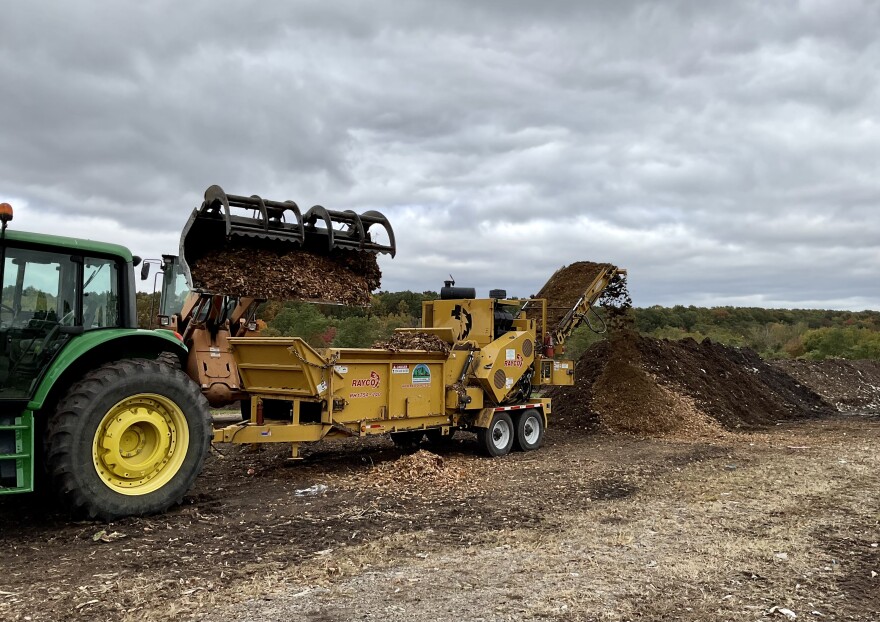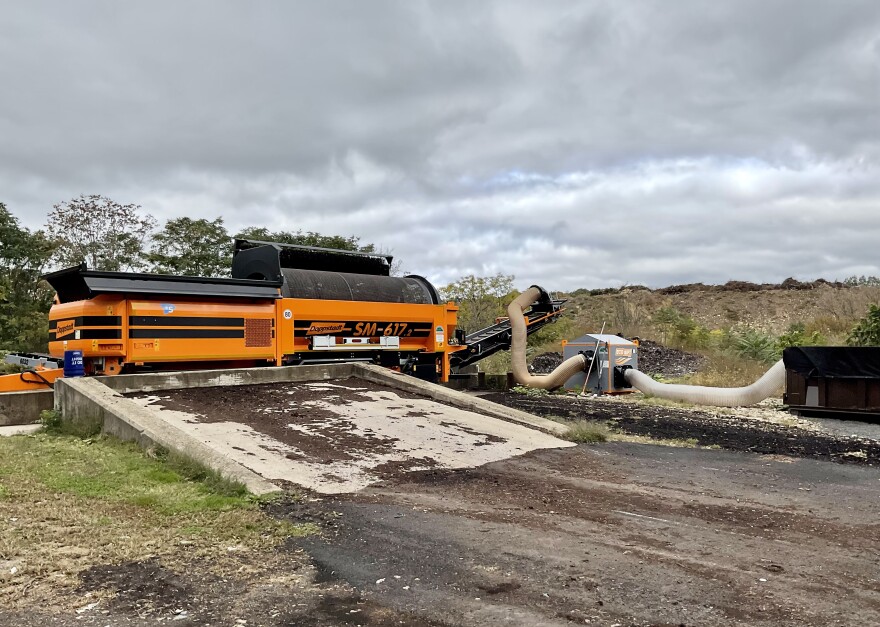It looked like a garbage truck and sounded like a garbage truck.
But the pumpkin shells, rotting apples and coffee grinds the truck was unloading on a recent day in Centre County will actually become something good: compost.
LISTEN to the story
“He’s going to take all the material that was just dumped, add leaves to it for our carbon source, and then he’ll run it through this grinder. And then put it onto the pile, and that just helps keep all the material the same size, so it breaks down evenly,” explained Shannon Dunlap, the refuse foreman in State College’s public works department.
Dunlap was explaining the multi-step process for turning those piles of food waste, leaves and grass clippings into compost.
“You can kind of see it steaming now. It’s already starting to work. You’re starting to create heat. It actually happens pretty quick,” said Dunlap.

Leaves get mixed with food scraps and fed into a grinder at the State College Borough’s composting facility. The borough, which already has a residential food waste composting program, is working with the Centre Region Council of Governments for its composting pilot program in 2023. Photo: Anne Danahy / WPSU
The borough of State College has had a residential curbside composting program for years. But the load that was just dropped off includes scraps from a pilot program the Centre Region, with support from the Centre County Recycling and Refuse Authority, launched this summer. The goal is to bring composting to neighboring municipalities.
“People really want to do something better with their food waste, and we know that about 40% of what goes into the landfill is actually compostable,” said Shelly Mato, the Center Region Council of Governments refuse and recycling program administrator.

Shelly Mato, refuse and recycling program administrator with the Centre Region Council of Governments, holding a compost container, one option for people who compost kitchen scraps. Mato is overseeing the agency’s pilot composting program in fall 2023. Photo: Anne Danahy / WPSU
The new pilot program covers the five townships included in the Centre Region Council of Government’s refuse contract: Benner, College, Ferguson, Harris and Patton townships. They’re more spread out than the borough, so curbside pickup made less sense. With this pilot program, residents who signed up to participate drop their compost off at one of five locked dumpsters.

This container in Ferguson Township is one the drop-off points for the Centre Region’s pilot composting program in summer and fall 2023. Photo: Anne Danahy / WPSU
“We have 650 people registered to do this,” Mato said. “We’ve so far diverted over 33 tons of food and garden waste.”
That’s right: 33 tons.
“We throw away a lot of food and food waste is heavy,” she said. “So think about a rotten tomato. It might not take up that much space, but it’s a lot heavier than your balled up chips bag.”
Some states are moving to keeping all food waste out of landfills, or have already started that process.
In Pennsylvania, composting is cropping up in a growing number of municipalities and counties too. According to the state Department of Environmental Protection, of those that reported their composting, the weight of organic materials was more than 1 million tons in 2021. That’s up from about 614,000 tons 20 years before.
According to the DEP, the number of counties reporting recycling data that included organics was 65 in 2021, compared to 60 in 2001. The number of municipalities reporting recycling data that included organics was 864 in 2021, up from 539 in 2001.
Along with the environmental benefits are economics.
“When you put food waste in the landfill, and it decomposes, it creates methane, which is a really, really powerful greenhouse gas. So we want to keep that out,” Mato said. “At the same time when you compost it, it becomes a really valuable soil addition. So you can mix it in with your garden, you can mulch with it, and it just returns all those nutrients to the soil.”

This trommel screen at the State College composting site is used to sift finished compost before it’s sold for landscaping. Photo: Anne Danahy / WPSU
Right now, the Centre Region program has pilot approval from the state DEP. State College is providing the dumpsters and pick up.
The pilot program will run through mid-November. Mato said they hope to continue it after that.

